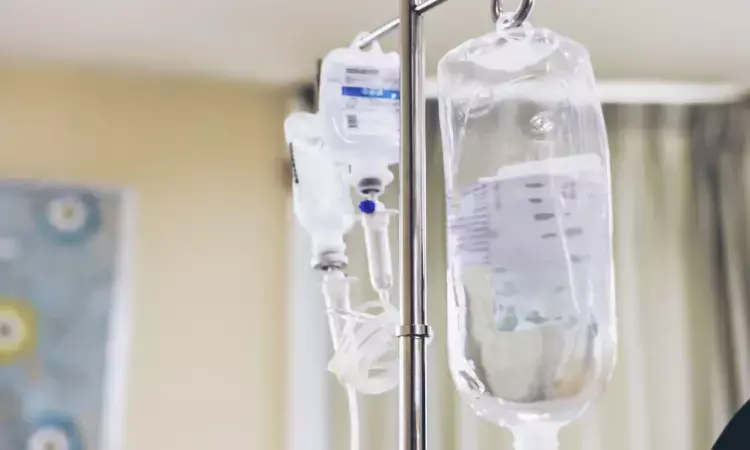- Home
- Medical news & Guidelines
- Anesthesiology
- Cardiology and CTVS
- Critical Care
- Dentistry
- Dermatology
- Diabetes and Endocrinology
- ENT
- Gastroenterology
- Medicine
- Nephrology
- Neurology
- Obstretics-Gynaecology
- Oncology
- Ophthalmology
- Orthopaedics
- Pediatrics-Neonatology
- Psychiatry
- Pulmonology
- Radiology
- Surgery
- Urology
- Laboratory Medicine
- Diet
- Nursing
- Paramedical
- Physiotherapy
- Health news
- Fact Check
- Bone Health Fact Check
- Brain Health Fact Check
- Cancer Related Fact Check
- Child Care Fact Check
- Dental and oral health fact check
- Diabetes and metabolic health fact check
- Diet and Nutrition Fact Check
- Eye and ENT Care Fact Check
- Fitness fact check
- Gut health fact check
- Heart health fact check
- Kidney health fact check
- Medical education fact check
- Men's health fact check
- Respiratory fact check
- Skin and hair care fact check
- Vaccine and Immunization fact check
- Women's health fact check
- AYUSH
- State News
- Andaman and Nicobar Islands
- Andhra Pradesh
- Arunachal Pradesh
- Assam
- Bihar
- Chandigarh
- Chattisgarh
- Dadra and Nagar Haveli
- Daman and Diu
- Delhi
- Goa
- Gujarat
- Haryana
- Himachal Pradesh
- Jammu & Kashmir
- Jharkhand
- Karnataka
- Kerala
- Ladakh
- Lakshadweep
- Madhya Pradesh
- Maharashtra
- Manipur
- Meghalaya
- Mizoram
- Nagaland
- Odisha
- Puducherry
- Punjab
- Rajasthan
- Sikkim
- Tamil Nadu
- Telangana
- Tripura
- Uttar Pradesh
- Uttrakhand
- West Bengal
- Medical Education
- Industry
Fluid therapy in critically ill adults with sepsis- Risks and benefits

USA: Fluids are one of the essential components in treating critically ill patients with sepsis. The latest review article published in the Journal of the American Medical Association (JAMA) on June 13, 2023 has pointed out how they should be administered in each phase of critical illness.
The researchers suggest "clinicians should consider the benefits and risks of fluid administration in each phase of critical illness, avoid hydroxyethyl starch use, and facilitate fluid removal for patients recovering from acute respiratory distress syndrome." They, however, add that optimal fluid management in sepsis patients remains uncertain.
- A phase 3, randomized clinical trials (RCTs) in which 3723 patients with sepsis who received 1 to 2 L of fluid reported that goal-directed therapy administering fluid boluses did not decrease mortality compared with unstructured clinical care (24.9% vs 25.4%).
- Another RCT reported that among 1554 patients in the intensive care unit with septic shock treated with at least 1 L of fluid compared with more liberal fluid administration, restricting fluid administration without severe hypoperfusion did not reduce mortality (42.3% vs 42.1%).
- An RCT of 1000 patients with acute respiratory distress with limited fluid administration and diuretics improved the number of days alive without mechanical ventilation compared with fluid treatment to attain higher intracardiac pressure (14.6 vs 12.1 days).
Based on these various research articles, it can be concluded that although fluid therapy is vital in treating patients who are critically ill with sepsis, it remains uncertain and does not improve mortality with fluid therapy
.Fernando G. Zampieri also noted that clinicians should consider the risks and benefits of fluid administration in each phase of critical illness and facilitate fluid removal for patients recovering from acute respiratory distress syndrome.
Dr Kamal Kant Kohli-MBBS, DTCD- a chest specialist with more than 30 years of practice and a flair for writing clinical articles, Dr Kamal Kant Kohli joined Medical Dialogues as a Chief Editor of Medical News. Besides writing articles, as an editor, he proofreads and verifies all the medical content published on Medical Dialogues including those coming from journals, studies,medical conferences,guidelines etc. Email: drkohli@medicaldialogues.in. Contact no. 011-43720751


